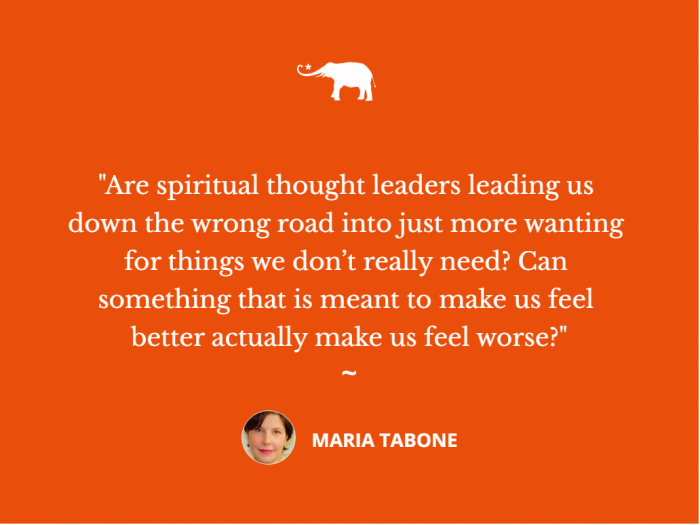One day my husband said to me, “I am getting tired of all these thought leaders telling everyone how to ‘live your best, extraordinary life.'”
He went on, “Does that mean there is something wrong with how I conduct my life? Do I need to buy their books and products and pay to hear them pontificate to improve what I already thought was a wonderful life? What if I like my ‘ordinary (but not so ordinary to me)’ life? I thought I was happy and having a great life.”
Recently with friends, I raised this topic. They, like my husband, felt that the self-help industry had turned into a marketing machine to sell products and monthly memberships…and how many of us really need their “help” and get anything out of it?
While I spent at least a half hour trying to defend the complex landscape of spirituality and wellness, it started me thinking. Are spiritual thought leaders leading us down the wrong road into just more wanting for things we don’t really need? Could the message be counterproductive? Can something that is meant to make us feel better actually make us feel worse?
It also begs the question: what is an extraordinary life? We live in a culture obsessed with consumerism and material possessions. We have a desire to be seen, heard, and liked on social media. It speaks to the ego and sense of self-worth. While no single perspective has special access to the truth, in the final analysis, it is our own perspective that determines our self-worth.
Not to mention, spiritual retreats can be costly, some into the thousands of dollars. It’s ironic that people who have this kind of money want to go on a retreat with monks who live with no material possessions at all to find out how to be happy!
So, let the buyer beware. Hero worship is where the trouble begins. I have come across many people who have become attached to a “spiritual” person, who then encased themselves into a false utopia governed by the belief system of one perspective. This is happening right now in our country around politics. We have seen firsthand the danger of wearing blinders, as it clouds judgment and abolishes a person’s ability to be objective.
While only we can change our lives, sometimes we need help. Everyone needs a mentor or someone who can provide encouragement at some point in life. Whether it be a loved one, friend, professional therapist, or yes, even a spiritual thought leader who helps guide your journey, it’s important to seek help when you need it.
But I, like many people, have read way too many “self-help” books, listened to countless speakers, and attended innumerable retreats. And while I have benefitted and continue to benefit from many great mentors, books, seminars, and personal interactions, I never lose sight that with all the wonderful people offering wisdom and guidance, it’s a business…and big business.
I will still continue to enjoy many speakers and thought leaders—but the first person I will look to for guidance is myself.






Read 0 comments and reply